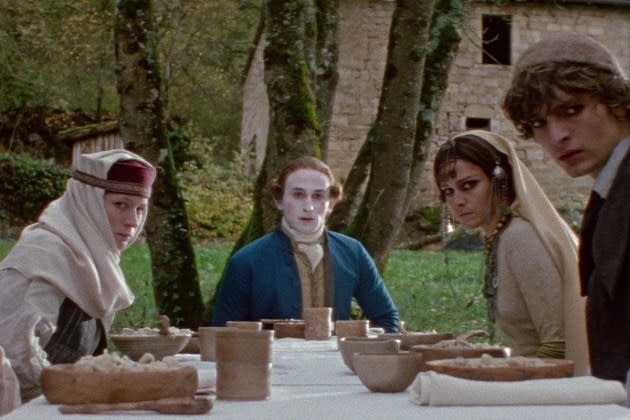‘The Vourdalak’ Review: Mood and Marionettes Make for a Pleasingly Odd French Vampire Drama

Vampires are eternal, and so are movies about them. The genre shows no signs of going bloodless anytime soon, even if the oldest texts continue to inspire some of its most compelling entries. Consider writer-director Adrien Beau’s “The Vourdalak,” an adaptation of Aleksey Konstantinovich Tolstoy’s 1839 “The Family of the Vourdalak,” a foundational novella that predates Bram Stoker’s “Dracula” by more than half a century. After premiering in Venice last year, the film arrives in theaters less than a week after the trailer for “The Witch” helmer Robert Eggers’ “Nosferatu” remake dropped — a coincidence, surely, but one that’s nevertheless emblematic of the ur-texts’ enduring influence.
“The Vourdalak” doesn’t exactly announce its blood-sucking bonafides, though the signs are all there. A stranger introducing himself as an emissary of the King of France (Kacey Mottet Klein) loses his way while traveling through a remote village and is refused entry from the first home he asks for help one misty night, though he is given parting advice in the form of a warning not to stop until reaching his destination. The next family he comes across, whom he’s been told can provide him with a horse, is absent its patriarch Gorcha (voiced by Beau himself) after he went off to fight the Turks, though not without a warning of his own.
More from Variety
“Wait six days for me. If, after those six days, I have not returned, say a prayer in memory of me, for I shall have been killed in battle,” are the words recalled by his daughter Sdenka (Ariane Labed of “Attenberg” and “The Lobster”). “But if ever, and may God preserve you, I were to return after six days have passed, I enjoin you to forget that I was your father and to refuse me entry whatever I may say or do — for then I shall be no more than an accursed vourdalak.”
The ominous message raises two related questions: What is a vourdalak, and when will the man make his way home? The answer to the first question is a vampire-like being with Slavic origins who prefers to feast on blood relations rather than strangers, while the answer to the second is that there wouldn’t be a movie if he returned within six days.
Return he does, though, and it’s something to behold. He resembles nothing so much as a living skeleton, but because he remains the family patriarch even in his diminished condition, no one dares speak the truth aloud or question his authority. This effect is achieved not via CGI or makeup but rather a life-sized marionette, a pleasingly off-putting lo-fi technique. Witnessing this creature isn’t pleasant, but it’s hard not to admire the filmmakers’ ingenuity in adding their mark to a long-established genre by taking a genuinely unexpected approach. Paired with Super 16mm cinematography awash in film grain, the uncanny creature’s strange movements and disembodied voice achieve a uniquely immersive effect. There’s a folkloric quality to both “The Vourdalak” and its title character, as though Beau were merely re-creating some obscure village’s interpretation of what creatures of the night looked like in that pocket of the world.
These initial scenes envision the vourdalak not as a sunlight-averse foe but as a withered creature with a not-quite terminal affliction from which there’s no recovery. Gorcha is still technically alive, such as it is, and so his family (including a younger brother named Yegor and grandson named Vlad) must continue to obey him. Given that he gained his affliction while fending off foreign invaders, the condition might be thought of as akin to a war injury or even post-traumatic stress disorder — the kind of thing everyone is aware of but no one feels qualified to do anything about.
The situation deteriorates faster than the not-quite-corpse, with “The Vourdalak” morphing into a fairly conventional vampire narrative in its second half while still feeling closer to something like Albert Serra’s “Story of My Death” (which imagines a conversation between Dracula and and aging Casanova) than it does to “The Last Voyage of the Demeter.” Everything about the film manages to be forward-thinking and old-school at the same time, giving the genre a bite in the neck it might not have wanted but certainly needed.
Best of Variety
Sign up for Variety’s Newsletter. For the latest news, follow us on Facebook, Twitter, and Instagram.
